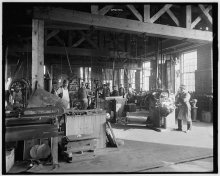 Thorstein Veblen was certainly a heterodox observer of modern capitalism. He was trained in the late nineteenth-century iteration of neoclassical economics, but he was more impressed by the irrationality of what he observed than the optimizing rationality that is postulated by the neoclassicals. He was also an intelligent observer and analyst of contemporary economic and sociological trends — not in theory but in the concrete forms that turn-of-the-century capitalism was taking in the United States and Europe. It is interesting, therefore, to examine his analysis of the business firm in The Theory of Business Enterprise, published in 1904. (I examined his critique of American universities in The Higher Learning in America in an earlier post.)
Thorstein Veblen was certainly a heterodox observer of modern capitalism. He was trained in the late nineteenth-century iteration of neoclassical economics, but he was more impressed by the irrationality of what he observed than the optimizing rationality that is postulated by the neoclassicals. He was also an intelligent observer and analyst of contemporary economic and sociological trends — not in theory but in the concrete forms that turn-of-the-century capitalism was taking in the United States and Europe. It is interesting, therefore, to examine his analysis of the business firm in The Theory of Business Enterprise, published in 1904. (I examined his critique of American universities in The Higher Learning in America in an earlier post.)
Here is how he describes his approach to the topic of American business:
In respect to its point of departure, the following inquiry into the nature, causes, utility, and further drift of business enterprise differs from other discussions of the same general range of facts. Any unfamiliar conclusions are due to this choice of a point of view, rather than to any peculiarity in the facts, articles of theory, or method of argument employed. The point of view is that given by the business man's work, - the aims, motives, and means that condition current business traffic. This choice of a point of view is itself given by the current economic situation, in that the situation plainly is primarily a business situation. (Preface)Veblen is sometimes credited with being one of the originators of institutional economics. This is due, in large part, to his effort to discover some of the institutional dynamics created for the modern industrial system by the incentives and constraints created for the owners and managers of firms.One of the central impressions that emerges from reading The Theory of Business Enterprise is this: the modern American industrial economy is a coordinated system that requires many things to happen in sync with each other; but the owners of the components of this system often have strategic interests that lead them to take actions leading to de-synchronization and short-term crisis. There is a serious conflict of interest that exists between the interests of the owner and the needs of the system - and the public's interests are primarily served by a smoothly functioning system. So owners are in conflict with the broader interests of the public.
So who is the primary actor, the "business man", in Veblen's account, and what are his or her motives?






